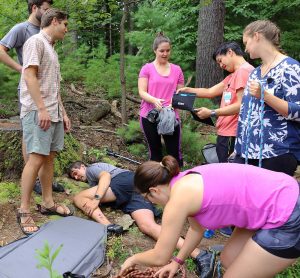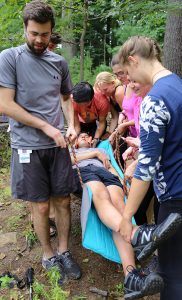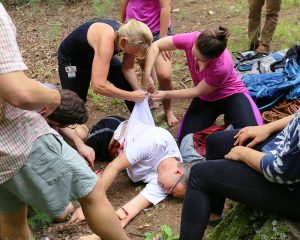Twice Bitten and a Lot Less Shy
Simulations prepare MAHEC family medicine residents for any emergency.

Although there was no one in sight, the scream coming from the wooded trail could be heard all the way from the parking lot. Luckily, it caught the attention of a group of third-year family medicine residents who had gathered by the nature trail behind the Mountain Area Health Education Center (MAHEC).
The residents had just discovered the trail was closed because of a bear sighting, which made the cry for help even more alarming. Unfortunately, it was after hours, and all they had with them was hiking gear.
With only a moment’s hesitation, the group ran into the woods to find a hiker sprawled face down at the bottom of an embankment. His eyes were closed tight against the pain, and he was clutching his leg above two puncture wounds. His backpack, a sleeping pad, and hiking poles lay nearby, scattered during his apparent fall.
One doctor squatted down next to the hiker to ask what had happened.
“A snake. I’ve been bitten by a snake,” the man moaned repeatedly.
He was unable to focus or respond to questions about the laceration on his head or any other potential injuries. It was clear the snake bite wasn’t the only concern but also head trauma and possibly a spinal cord injury.
The team of six residents worked quickly to fashion a litter using rope and the victim’s sleeping pad and then to immobilize his neck with a SAM splint one of them kept in his hiking gear. They worked together to carry him up the trail to the parking lot, where they paused to discuss their next steps.
The conversation was cut short when the victim, Will McLean, MD, suddenly got up. He was joined by Susan Alexander, MD, and Benjamin Gilmer, MD, who designed the wilderness medicine simulation.

“What did you do well?” Alexander asked the residents who were animated from the exertion and adrenaline.
A lively conversation ensued as the residents and MAHEC faculty explored their individual and collective responses to this emergency scenario. They also discussed a simulated bear attack in which Dr. Gilmer played a convincing victim.
The residents agreed that these simulations help make their classroom learning stick and force them to think quickly on their feet.
“We are trained to work in an environment that provides quick and easy access to life-saving treatments like code carts and AEDs, for example,” third-year resident Troy Jackson, MD, explained. “Out in the woods, improvisation is key.”
Being able to create these real-life scenarios is what makes simulation education such an integral part of MAHEC’s family medicine residency curriculum.
“Simulation has the potential to be one of the best teaching tools in resident education,” Dr. Alexander explained. “It allows for residents to hone skills via hands-on learning in a stress-free environment, to work in teams with their peers, and to share observations about the scenarios in real time with each other under the guidance of their faculty.”
Alexander has helped expand the simulation curriculum for MAHEC’s family medicine residents, working with MAHEC’s simulation center director, Elaine Alexander, RN, MSN, and MAHEC faculty physicians like Gilmer and McLean. Residents participate in simulation activities one to two times per month, often in MAHEC’s new state-of-the-art simulation center.
This year, residents will get hands-on practice in a variety of real-life scenarios that include obstetrical emergencies, pediatric respiratory distress, acute coronary syndrome, and sudden liver failure, among others. The immersive nature of simulated learning is what makes it such a powerful learning tool, according to Elaine Alexander.
“Our simulation technology is so sophisticated and lifelike, that learners can almost forget the scenarios aren’t real,” shared Alexander. “You get an opportunity to put your skills into practice. But you can make mistakes in a simulation, learn from them, and no one will get hurt.”

The wilderness simulation is a great example of how real-life practice makes perfect. After debriefing with faculty on the snake bite scenario, residents participated in a more complicated bear attack simulation and improved their response time, emergency decision-making skills, and team work.
Third-year resident Brittney Macdonald, MD, is already looking forward to the next one.
“These sim activities are a unique opportunity to practice high-stakes scenarios in a supportive and collegial environment,” Macdonald said. “I highly value them and hope to utilize the sim center even more.”
Visit mahec.net to learn more about MAHEC’s family medicine residency program.
